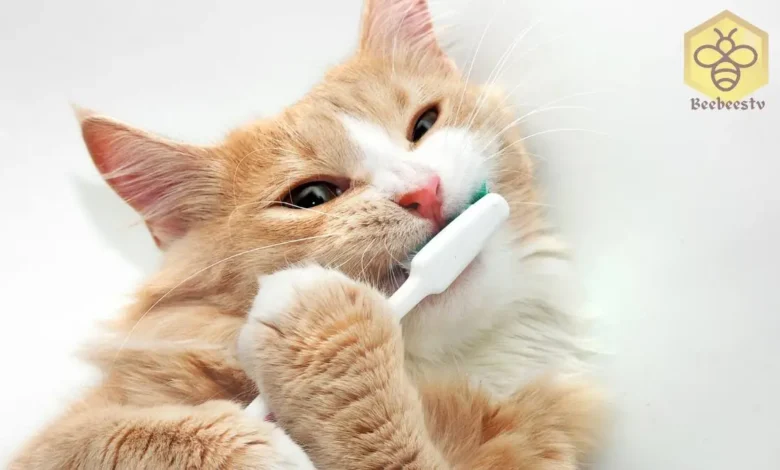Cat Teeth: how many teeth do cats have?

how many teeth do cats have?
Table of Contents
Understanding Your Cat Teeth
Like humans, cats have two sets of teeth: baby teeth and adult teeth. Kittens typically start losing their baby teeth around 3 months old, and by the time they are 6 months old, they should have a full set of 30 adult teeth.
Cats use their teeth for more than just eating. They also use them for hunting, playing, and even self-defense. However, dental problems can be a common issue for cats, leading to pain, tooth loss, and other health complications.
Types of Cat Teeth
Cats have four types of permanent teeth:
Incisors
Incisors are the small, front teeth used for cutting and biting. There are 6 incisors on the top jaw and 6 on the bottom.
Canine Teeth
Canine Teeth are the sharp fangs used for hunting and defense. There are 2 canine teeth on the top jaw and 2 on the bottom.
Premolars
Premolars are larger teeth used for tearing and holding prey. There are 6 premolars on the top jaw and 4 on the bottom.
Molars
Molars are used for crushing bones and hard kibble. There are 2 molars on the top jaw and 2 on the bottom.
| Tooth type | Number of upper teeth | Number of lower teeth | Function of Tooth |
|---|---|---|---|
| Incisors | 6 | 6 | Scraping and grooming |
| Canines | 2 | 2 | Scraping and gripping |
| Premolars | 6 | 4 | Grinding and chewing |
| Molars | 2 | 2 | Crushing and grinding |
Why Dental Care is Essential for cat teeth
Regular dental care is crucial for maintaining your cat’s overall health. Brushing your cat’s teeth daily, starting from a young age, can help prevent cavities and gum disease. A healthy diet also plays a role in dental health, providing essential nutrients and avoiding foods that can contribute to dental problems.
One of the most common dental issues in cats is tooth resorption, a condition where the tooth decays from the inside out. This can cause severe pain and lead to loss of appetite. Regular dental checkups, especially for older cats, are essential to detect and treat dental problems early.
Dental Care Tips
- Brush your cat’s teeth daily: Use a cat-specific toothbrush and toothpaste.
- Feed a high-quality diet: Choose a food formulated to support dental health.
- Schedule regular dental checkups: Visit your veterinarian for routine dental exams.
- Look for signs of dental problems: These include bad breath, drooling, difficulty eating, and pawing at the mouth.
Common Dental Problems in Cats
In addition to tooth resorption, cats can suffer from other dental issues, such as:
- Periodontal disease: This occurs when bacteria build up in the mouth, leading to inflammation of the gums and surrounding tissues.
- Tooth fractures: Cats can break their teeth due to accidents or chewing on hard objects.
- Abscesses: These are pockets of pus that can form around infected teeth or gums.
- Oral tumors: While less common, cats can develop benign or malignant tumors in the mouth.
Signs of Dental Problems
It’s important to be aware of the signs of dental problems in cats, as they can often hide their discomfort. Some common symptoms include:
- Bad breath
- Excessive drooling
- Difficulty eating or chewing
- Pawing at the face
- Swelling or redness of the gums
- Loss of appetite
- Weight loss
Preventing Dental Problems
To help prevent dental problems, consider the following:
- Provide plenty of fresh water: Adequate hydration is essential for oral health.
- Avoid giving your cat hard treats: These can contribute to tooth fractures.
- Consider dental chews: Some dental chews can help clean teeth and freshen breath.
- Don’t share your food with your cat: Human food can be harmful to cats and contribute to dental problems.

Professional Dental Care
Even with regular home care, your cat may still require professional dental cleaning. Your veterinarian can perform a thorough examination of your cat’s teeth and gums and recommend appropriate treatments, such as:
- Dental cleaning: This involves removing plaque and tartar buildup from the teeth and gums.
- Extractions: If a tooth is severely damaged or infected, it may need to be extracted.
- Root canals: In some cases, root canals can be performed to save a damaged tooth.
By following these guidelines and seeking professional dental care when needed, you can help your cat maintain optimal oral health and enjoy a long, happy life.
FAQs About Cat Teeth
5 Frequently Asked Questions About Cat Teeth:
- How many teeth do adult cats have?
Adult cats typically have 30 teeth.
- When do kittens lose their baby teeth?
Kittens usually start losing their baby teeth around 3 months old, and by 6 months old, they should have all 30 adult teeth.
- What are the signs of dental problems in cats?
Signs of dental problems in cats include bad breath, excessive drooling, difficulty eating, pawing at the face, swelling or redness of the gums, loss of appetite, and weight loss.
- How often should I brush my cat’s teeth?
It’s ideal to brush cat teeth daily, but even weekly brushing can make a significant difference.
- What can I do to prevent dental problems in my cat?
In addition to brushing cat teeth and feeding them a healthy diet, you can also provide plenty of fresh water, avoid giving them hard treats, and consider using dental chews.


